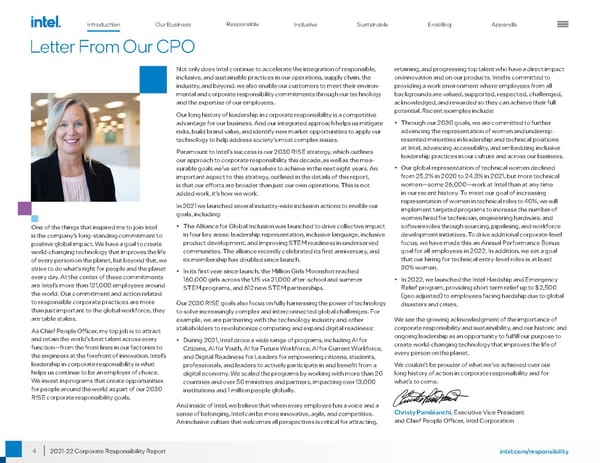Our Business Responsible Inclusive Sustainable Enabling Appendix 4 intel.com/responsibility 2021-22 Corporate Responsibility Report Introduction Letter From Our CPO One of the things that inspired me to join Intel is the company’s long-standing commitment to positive global impact. We have a goal to create world-changing technology that improves the life of every person on the planet, but beyond that, we strive to do what’s right for people and the planet every day. At the center of these commitments are Intel’s more than 121,000 employees around the world. Our commitment and action related to responsible corporate practices are more than just important to the global workforce, they are table stakes. As Chief People Officer, my top job is to attract and retain the world’s best talent across every function—from the front lines in our factories to the engineers at the forefront of innovation. Intel’s leadership in corporate responsibility is what helps us continue to be an employer of choice. We invest in programs that create opportunities for people around the world as part of our 2030 RISE corporate responsibility goals. Not only does Intel continue to accelerate the integration of responsible, inclusive, and sustainable practices in our operations, supply chain, the industry, and beyond, we also enable our customers to meet their environ - mental and corporate responsibility commitments through our technology and the expertise of our employees. Our long history of leadership in corporate responsibility is a competitive advantage for our business. And our integrated approach helps us mitigate risks, build brand value, and identify new market opportunities to apply our technology to help address society’s most complex issues. Paramount to Intel’s success is our 2030 RISE strategy, which outlines our approach to corporate responsibility this decade, as well as the mea - surable goals we’ve set for ourselves to achieve in the next eight years. An important aspect to this strategy, outlined in the details of this report, is that our efforts are broader than just our own operations. This is not added work, it’s how we work. In 2021 we launched several industry-wide inclusion actions to enable our goals, including: • The Alliance for Global Inclusion was launched to drive collective impact in four key areas: leadership representation, inclusive language, inclusive product development, and improving STEM readiness in underserved communities. The alliance recently celebrated its first anniversary, and its membership has doubled since launch. • In its first year since launch, the Million Girls Moonshot reached 160,000 girls across the US via 21,000 after-school and summer STEM programs, and 612 new STEM partnerships. Our 2030 RISE goals also focus on fully harnessing the power of technology to solve increasingly complex and interconnected global challenges. For example, we are partnering with the technology industry and other stakeholders to revolutionize computing and expand digital readiness: • During 2021, Intel drove a wide range of programs, including AI for Citizens, AI for Youth, AI for Future Workforce, AI for Current Workforce, and Digital Readiness for Leaders for empowering citizens, students, professionals, and leaders to actively participate in and benefit from a digital economy. We scaled the programs by working with more than 20 countries and over 50 ministries and partners, impacting over 13,000 institutions and 1 million people globally. And inside of Intel, we believe that when every employee has a voice and a sense of belonging, Intel can be more innovative, agile, and competitive. An inclusive culture that welcomes all perspectives is critical for attracting, retaining, and progressing top talent who have a direct impact on innovation and on our products. Intel is committed to providing a work environment where employees from all backgrounds are valued, supported, respected, challenged, acknowledged, and rewarded so they can achieve their full potential. Recent examples include: • Through our 2030 goals, we are committed to further advancing the representation of women and underrep - resented minorities in leadership and technical positions at Intel, advancing accessibility, and embedding inclusive leadership practices in our culture and across our business. • Our global representation of technical women declined from 25.2% in 2020 to 24.3% in 2021, but more technical women—some 26,000—work at Intel than at any time in our recent history. To meet our goal of increasing representation of women in technical roles to 40%, we will implement targeted programs to increase the number of women hired for technician, engineering hardware, and software roles through sourcing, pipelining, and workforce development initiatives. To drive additional corporate-level focus, we have made this an Annual Performance Bonus goal for all employees in 2022. In addition, we set a goal that our hiring for technical entry-level roles is at least 30% women. • In 2022, we launched the Intel Hardship and Emergency Relief program, providing short term relief up to $2,500 (geo adjusted) to employees facing hardship due to global disasters and crises. We see the growing acknowledgment of the importance of corporate responsibility and sustainability, and our historic and ongoing leadership as an opportunity to fulfill our purpose to create world-changing technology that improves the life of every person on the planet. We couldn’t be prouder of what we’ve achieved over our long history of action in corporate responsibility and for what’s to come. Christy Pambianchi, Executive Vice President and Chief People Officer, Intel Corporation
 Intel Corporate Responsibility Report Page 3 Page 5
Intel Corporate Responsibility Report Page 3 Page 5